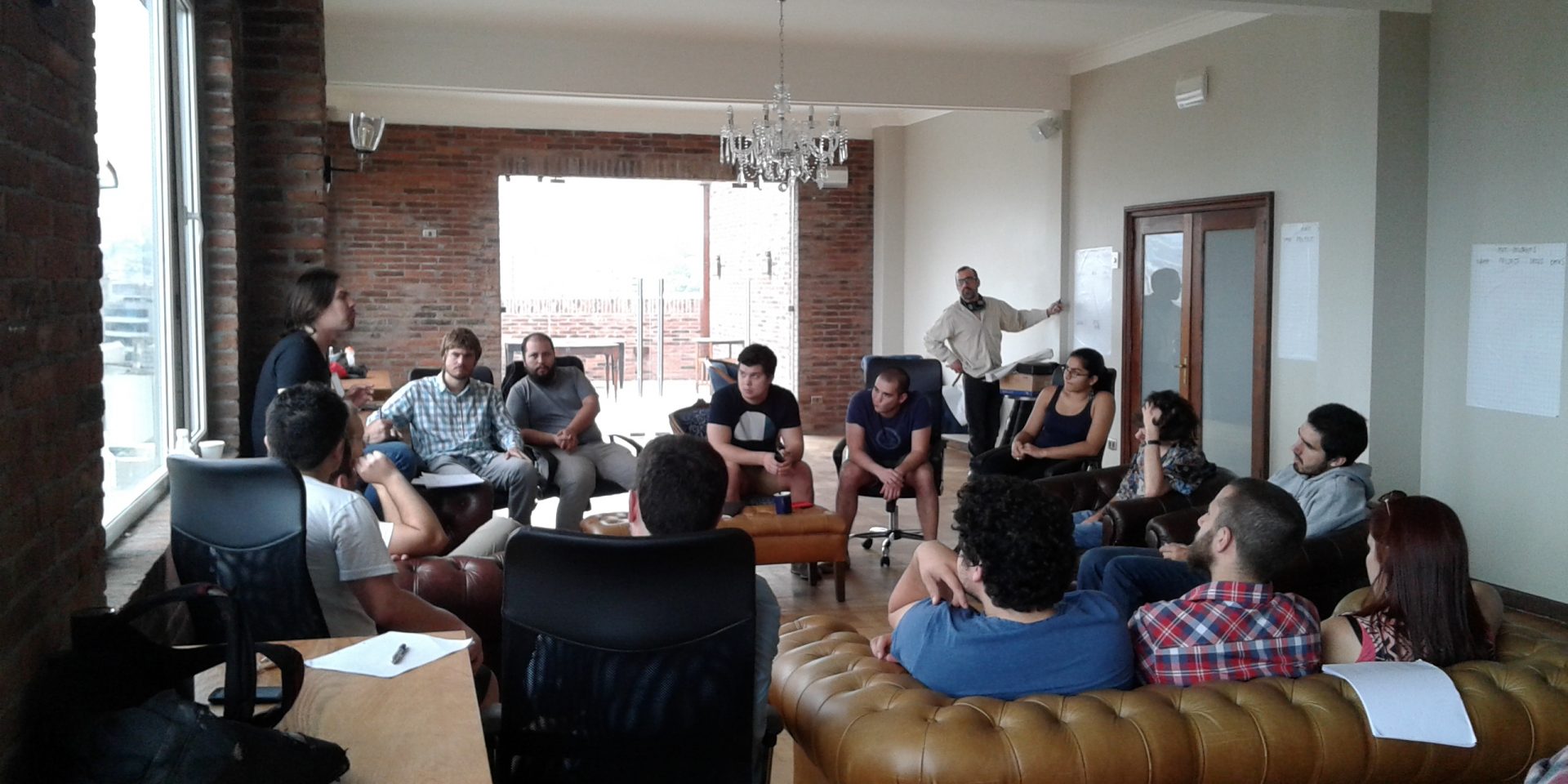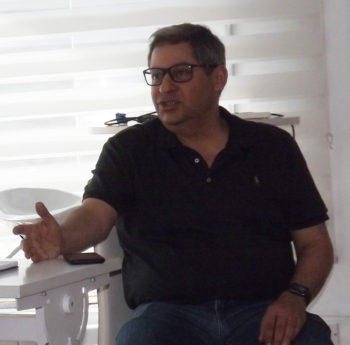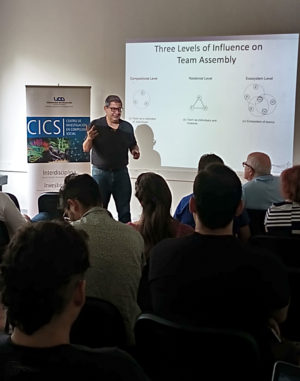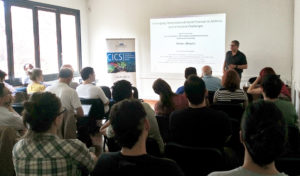
Ten years ago, the prestigious journal Science published an article entitled “Computational Social Science.” In it, Noshir Contractor together with prestigious scientists such as David Lazer, Alberto László Barabási, Lada Adamic, Sinan Aral, Nicholas Christakis, among others, wrote about the emergence of a new way of doing social sciences which was possible thanks to the massive and growing digitalization of human interaction. Thus, such extensive information about ourselves, as our consumption, our friends, our digital interests – in addition to other large-scale data, Big Data – could be digitized and studied, allowing us to answer many questions about the human social system, using these anonymized and aggregated data.
At the beginning of January, Professor Contractor visited Chile for the first time and within his busy schedule, took time to visit the CICS and gave the “Advances and Projections in Computational Social Sciences” seminar. On the occasion, he provided a wide range of examples on the scope and developments that Computational Social Sciences has achieved since that article in the journal Science was released. With the humility that marks him for sharing his knowledge, the researcher took some time to answer our concerns.

– It has been shown that diversity is important for a team training and productivity; however, other dimensions could interact and cause diversity in the team to fail. What is the state of the art in this area and where should the researchers put their efforts?
What we know about team diversity is something my good friend Scott Beach wrote in a book called “Difference.” He tells us that if you give different teams a task that requires a creative solution, and some teams are composed of very similar people and others are very diverse, you can see how creative they are or how creative the solution is. What we would like to believe, is that teams which are more diverse will have the most creative solution and will have a creativity score of 10 – which considers the skills of the team – compared to other homogeneous teams. But that was not what we discovered: if you have twenty different teams that are similar and twenty different, both teams have on average a score of 5 in a specialization from 1 to 10. But what we also discovered, and this is the interesting part, is that even when both teams have a similar score, in the diverse team someone had a score of 10 and someone got a 1; In other words, someone in the diverse team did very well and someone very badly. In the similar or homogeneous team, almost the whole team obtained a score of 5. This means that, if you want to have a very creative idea, you will only get it from a creative team, but you have to be aware that half the time It will gives a horrible idea. In other words, you have more chances of getting a good idea from a diverse team, and you will never get it from a homogeneous team. But you will not always have a good idea from a diverse team. So, why does this happen? I think what they are focusing on most is to see which characteristics are similar or which are diverse, and not all similarities are bad and not all types of diversities are necessarily good. So one of the things that people have started to thinking about, is “Can we have people who have similarities in some areas that allow them to trust and get along with others, talk about those things in common, but have diversity in the work they do?” One could be a good statesman, another could be a modeler, another could be a philosopher, because they have created trust in those things that are common to them, and that do not necessarily have to do with work, but with something personal, such as a taste for some soccer team. The hypothesis is that we should enhance the similarities about things that bring people together but that are not related to the work they do, which will allow them to have diversity in the characteristics that are related to the work they do there. So, for creativity to arise, you have to make sure that these people see something in common and that they have in common and which is something they enjoy but it has nothing to do with work, it is good and why not use it. It is a way to build similarities.
Chile and Science
– After being in NetSciX and now in our CICS Research Camp, what is your impression of the level of science we have in Chile today?
One of the reasons to participate in the NetSciX, is that I was very excited about the proposals that would be presented and I thought support them and I am very happy to have done so. I was on the Board of the NetSci Society when Leo Ferres (Data Science Institute) and his colleagues made me the proposal to carry out the NetSciX in Santiago.
One of the assistants to the talk in the Research Camp this morning, told me there is no currently research project in Social Sciences having a Government sponsorship, and that means that it is not reflecting what is done today around the world, because there are many people who are working in this area.
The number of articles published has been exponentially growing and many of the problems we face today in society can be addressed, in some way, by taking a network perspective. So, the reason for having done the NetSciX here, was to increase the awareness on this issue and not only that, but also to create community in this area.
These days, I have seen that in Chile there are people who are doing things “alone” and that, with these activities, they are realizing that they can come together and become a force. Sometimes, in universities, “a whole is less than some of its parts” and that is very common in relation to people who are doing network science, data science, research in complexity in Chile. There are a lot of smart people working in these areas, but they are not seen as part of a “whole” in a group. That’s why I think what happened at NetSciX is very important: the creation of Data Science, the UDD’ Science area and also the participation of Telefónica, as well as the Pontificia Universidad Católica and Entel, all of them as industrial partners, which is very important in this area. All this helps us now for having a critical mass of people who is able to install a brand in Chile; it already exists in the United States, with highly recognized Chileans, such as César Hidalgo from MIT. The community in Santiago has not created a joint identity and events like this help in that sense.
 – In this same vein, how do you see the future of Data Science and Computational Social Sciences worldwide? And what are the main differences between these two disciplines?
– In this same vein, how do you see the future of Data Science and Computational Social Sciences worldwide? And what are the main differences between these two disciplines?
What happens is that Data Science is like a kind of “successor statistics”. People look at data, which is what statistics do, but today there are many more data available and some of the methodologies we use to analyze this data require much more computational power. Data science is helping to manage, manipulate, analyze and interpret a large volume of data; that is the challenge. Until recently, statistics only focused on analysis, because many of our data were small and simple, so they were put into spreadsheets; but now, with such a level of data, which we call not only Big Data but Broad Data, -because it is of different types and you try to model them and do different things-, it requires much more effort than statistics. Then, data science allows people to be experts in data collection and data conservation.
On the other hand, when you have a ten-people network, it is very easy to perform some calculations; but if you have a million-people network, the same approach will not work; not even all the computers in the world can do it, so you must have intelligent methods that allow you to do abbreviated methods, new approaches, new algorithms to try to obtain that data, and then you have to learn to interpret them, how to know if that information is good; in the same way, you have to make predictions and be able, eventually, to change them, besides having confidence in the data you have. So, there is an integral vision of Data Science, called automation, which means how to use Data Science to propose alternative models, what should we change in what we are doing today, so that, for example, climate change goes in the opposite direction. That’s Data Science.
span style=”font-weight: 400;”>The Computational Social Sciences use Data Science to answer questions about Social Sciences, such as psychology, sociology, political science, economics. But at the same time, Data Science can be used for many other things that have nothing to do with Social Sciences, for example, to build better missiles, or to design a better computer system, or to study protein networks. What happens now, is that each area is increasing the use of computational thinking to answer different questions.
– Related to women in science, what is your opinion regarding the little room or visibility they have had in this area and that, perhaps, would now be changing?
It is a very good question, and there are two ways to address this issue. One, is that there have been women who have had very important roles in science in general. When we see there are not many women in science, it is because the way in which history has been written has left out a lot of outstanding women who have not received any credit for their work. Now, many people return to investigate the DNA discovery or computing; or the main leaders of the Apollo 11 mission, or the design of missiles in the military area, and many of the people who were really important in these areas were, precisely, women. So, part of the answer is not that women are not doing things, but that they are doing it invisibly.
It is also true that many women do not get involved. The reason may be that women do not know many success stories. For example, when you meet young people who must decide what they want to do, they look at these areas and do not know the names of the researchers because those are hidden. So, it is not a matter of knowledge, but also that scientific women are not there or do not appear to inspire other young women.
During the NetSciX I met and shared a dinner with Francisca Varela of the Data Science Institute of the Universidad del Desarrollo, who impressed me a lot. About two years ago, she received a very important prize for contributing to the creation of an NGO to help women to do computer programming. Also, in other countries women are integrating to these areas.
There is a research that realizes that research teams which have at least one woman, do better because women have creative ideas that men can not visualize. So, you do not have women within your team because you have to do it, to reduce the disparity: you do it because it helps to have a better product. That said, I like to see that having women is not a need: it is an opportunity for you, for having a better team. Science does not need women because they are women, but because they provide opportunities.
The Interdisciplinary Doctorate in Social Complexity Sciences
– You must have met with other students around the world, how far (or near) are we from what they are doing today in this area of science?
I have had many conversations about this subject with students from many countries in the world: China, India, European countries, and I would say that it will always be a challenge to learn these subjects in English, which is not your native language. I am very impressed with the level of fluency that this PhD students have, so the selection committee did a very good job in making sure that success is not limited to an inability to speak or write mainly, because in the research, talking is important, but in the most important publications, you must know how to write well.
This group of students has an interdisciplinary Doctorate that is not very common in the world. There are very few ones like this one, which does not mean in other universities students are not doing interdisciplinary research, but they are not doing it in an interdisciplinary program like this: in the area of network science, data science and computational sciences, there should be about three or four in the world that I know. For example, in Boston there is an interdisciplinary doctorate in network science. The University of Janos Kértesz, the Central European University in Budapest, also offers an interdisciplinary doctorate in the same area.
What the students have here is an opportunity that is very unusual but that, at the same time, we will see very often later. But today it is not very common.
 – Do you have any suggestions for the Data Science and Computational Social Sciences training in our Doctorate?
– Do you have any suggestions for the Data Science and Computational Social Sciences training in our Doctorate?
I do not know enough about this specific program, but given the amount of knowledge and advances that have been in this area, it is not expected that a Doctoral student of Data Science, or Network Science or Computational Social Sciences have a vast experience in all these areas. On the other hand, I believe that the best that a PhD program can provide to students is a vast experience in one of these areas.
Most of my work has been developed in understanding why we have created networks, how they are formed and how they perform, from the points of view of Social Sciences. There are a lot of social science theories about that and that is my experience. If I’m in a PhD program, I need to continue building experience in the area I chose, but I need to know enough about all the new approaches to data science and machine learning. For example, the latter has a lot of focus on how to form models with data, have a new matrix on how to create a good model, and how to measure a good model from a bad model; All these are things that I have to learn in a PhD program, even if my area is different, why? because if I want to collaborate with people who are in those other areas, I need to understand what they are saying and not only that, I need two more things: I need to understand what they are saying and also the results of machine learning, in order to take them and be able to contribute to the advances of the theory of networks on Social Sciences; and, secondly, to know enough about what they are doing so that if I have a question they can not answer with their methods, (…) I can push them to make more advances in techniques, and their techniques can push us to make more progress.
If a PhD program creates a context where each student is able to know enough about other areas, to improve and ask better questions, or answer a question in a better way or ask new questions, or answer an existing question on their own competition area, that would be fantastic and also it challenges people in other areas.
(…) It would be wonderful if a Doctorate could deepen in all areas, but that will not happen, and what would we do it if we do have teams for that. If you and I are part of a team, then it is better that I know more than one area and not enough in yours, so I can work with you; and you are an expert in another area but not enough in which I am, so we can also work together.